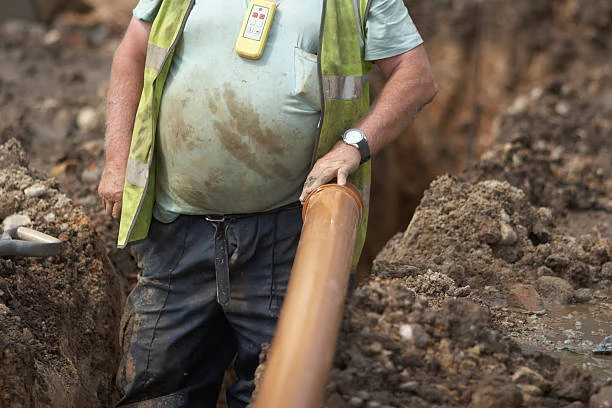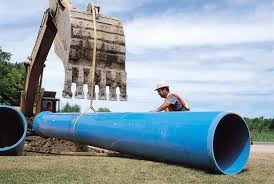When it comes to plumbing, choosing the right Types of Plumbing Pipes is crucial for durability, cost-efficiency, and long-term performance. There are several types of plumbing pipes, each with its unique advantages and applications. In this article, we will explore the five most common types of plumbing pipes you’ll find in homes today.
1. PVC Pipes: The Affordable and Versatile Option
Polyvinyl chloride (PVC) is one of the most popular materials used in residential plumbing systems. PVC pipes are lightweight, cost-effective, and highly durable, making them an excellent choice for various plumbing applications.
Advantages of PVC Pipes
- Affordable: PVC is one of the least expensive plumbing pipe materials.
- Durable: It resists corrosion, rust, and chemical damage.
- Easy to Install: PVC pipes are easy to cut and join using solvent cement.
- Non-toxic: Safe for transporting drinking water.
Common Applications for PVC Pipes
PVC pipes are commonly used in:
- Drainage Systems: Ideal for waste removal and drainage systems.
- Vent Systems: Used for venting in drainage systems.
- Irrigation Systems: Often found in sprinkler and irrigation setups.
Drawbacks of PVC Pipes
While PVC is a great choice for many plumbing projects, it does have some limitations:
- Temperature Sensitivity: PVC pipes can warp or crack under extreme temperatures.
- Brittle: While durable, PVC can become brittle over time if exposed to sunlight for long periods.
2. Copper Pipes: The Reliable Classic
Copper has been used in plumbing for centuries and continues to be a popular choice due to its reliability, longevity, and resistance to corrosion. Although copper is more expensive than PVC, it offers several advantages for homeowners.
Advantages of Copper Pipes
- Longevity: Copper pipes can last over 50 years if properly maintained.
- Resistant to Corrosion: Copper resists the effects of rust and corrosion.
- Non-toxic: Copper is safe for drinking water and does not leach harmful chemicals.
- Heat Resistance: It can handle both hot and cold water with ease.
Common Applications for Copper Pipes
Copper is typically used in:
- Hot and Cold Water Lines: Copper pipes are ideal for both supply and drainage lines.
- HVAC Systems: Copper pipes are widely used in air conditioning systems and refrigeration units.
- Hydronic Heating Systems: Copper is commonly used in radiant heating systems.
Drawbacks of Copper Pipes
- Cost: Copper pipes are more expensive than PVC and PEX alternatives.
- Prone to Theft: Copper pipes are sometimes targeted for theft due to their high scrap value.
- Difficult to Install: Copper requires specialized tools for cutting and joining, which can increase installation costs.
3. PEX Pipes: The Flexible and Efficient Solution
Cross-linked polyethylene (PEX) pipes are relatively new to the plumbing scene but have quickly gained popularity for their flexibility, ease of installation, and durability. PEX is resistant to scaling and corrosion, making it a reliable choice for both hot and cold water applications.
Advantages of PEX Pipes
- Flexible and Easy to Install: PEX can be bent around corners and obstacles, reducing the need for additional fittings.
- Durable: PEX pipes are resistant to cracking, freezing, and corrosion.
- Cost-Effective: Generally more affordable than copper pipes.
- No Need for Soldering: PEX pipes are joined with push-fit or crimp connections, eliminating the need for soldering.
Common Applications for PEX Pipes
PEX is commonly used in:
- Water Supply Lines: Ideal for both hot and cold water lines in residential plumbing.
- Underfloor Heating Systems: PEX pipes are widely used in radiant floor heating applications.
- Retrofit Installations: PEX is a great option for repiping existing homes due to its flexibility.
Drawbacks of PEX Pipes
- UV Sensitivity: PEX can degrade when exposed to sunlight, so it should be kept indoors or protected.
- Chemical Sensitivity: Some types of PEX may not be suitable for use with certain chemicals.
- Not Ideal for Outdoor Use: PEX pipes are not recommended for use in outdoor applications where they may be exposed to extreme temperatures.

4. Galvanized Steel Pipes: The Old Standard
Galvanized steel pipes were once the go-to material for plumbing systems in many homes. However, they have largely been replaced by newer, more durable materials like PEX and PVC. Galvanized steel pipes are coated with a layer of zinc to prevent rusting, but they are not without their issues.
Advantages of Galvanized Steel Pipes
- Strength: Galvanized steel is strong and can withstand high pressure.
- Longevity: They can last for decades if properly maintained.
- Corrosion-Resistant: The zinc coating helps prevent rust and corrosion, although not indefinitely.
Common Applications for Galvanized Steel Pipes
Galvanized steel pipes were typically used in:
- Water Supply Lines: Before PEX and copper became widely available, galvanized steel was commonly used for plumbing water supply lines.
- Outdoor Applications: Galvanized steel was often used in outdoor plumbing due to its strength and resistance to weather.
Drawbacks of Galvanized Steel Pipes
- Prone to Corrosion: Over time, the zinc coating degrades, and the pipes may begin to rust internally, causing clogs and water contamination.
- Heavy: Galvanized steel pipes are heavy and difficult to work with.
- Shorter Lifespan: Although strong, they have a shorter lifespan compared to copper or PEX.
5. Cast Iron Pipes: The Durable Option for Drainage
Cast iron pipes are known for their strength and ability to handle heavy waste loads. They were commonly used for drain and waste systems in older homes. Although cast iron is still used in some plumbing applications, it has been mostly replaced by more modern materials like PVC and PEX.
Advantages of Cast Iron Pipes
- Strength and Durability: Cast iron pipes are incredibly strong and can withstand high pressure and heavy use.
- Noise Reduction: Cast iron is great for reducing the sound of water flowing through pipes.
- Long Lifespan: When properly maintained, cast iron pipes can last for many decades.
Common Applications for Cast Iron Pipes
Cast iron pipes are most often found in:
- Drainage Systems: Ideal for carrying waste and water away from the home.
- Sewer Lines: Cast iron is used for main sewer lines because of its strength and durability.
Drawbacks of Cast Iron Pipes
- Heavy: Cast iron pipes are bulky and difficult to handle.
- Corrosion: Over time, cast iron pipes can rust and corrode, leading to leaks and blockages.
- Expensive: Cast iron is more expensive than many newer alternatives like PVC and PEX.
Conclusion: Choosing the Right Types of Plumbing Pipes for Your Home
Selecting the right plumbing pipes for your home depends on various factors, including budget, durability, and the type of plumbing system you need. PVC, copper, PEX, galvanized steel, and cast iron all have their unique benefits and drawbacks. Understanding the pros and cons of each type can help you make an informed decision based on your specific plumbing needs.
For most homeowners, modern materials like PEX and PVC offer affordable, durable, and flexible options for both hot and cold water supply lines. Meanwhile, copper and cast iron continue to serve important roles in specialized applications. By carefully considering your options, you can ensure that your plumbing system will function efficiently for years to come.
Frequently Asked Questions (FAQs)
1. What are the advantages of PEX over copper pipes?
PEX is more affordable, flexible, and easier to install than copper. It also resists freezing better than copper.
2. Are PVC pipes safe for drinking water?
Yes, PVC pipes are safe for transporting drinking water when they are properly installed and meet industry standards.
3. How long do galvanized steel pipes last?
Galvanized steel pipes can last up to 50 years, but they tend to corrode over time, especially in older homes.
4. Can PEX pipes be used for outdoor plumbing?
PEX is not ideal for outdoor plumbing as it can degrade when exposed to UV light and extreme temperatures.
5. What’s the difference between cast iron and PVC pipes for drainage?
Cast iron pipes are stronger and more durable, but PVC pipes are lighter, easier to install, and resistant to corrosion.


















